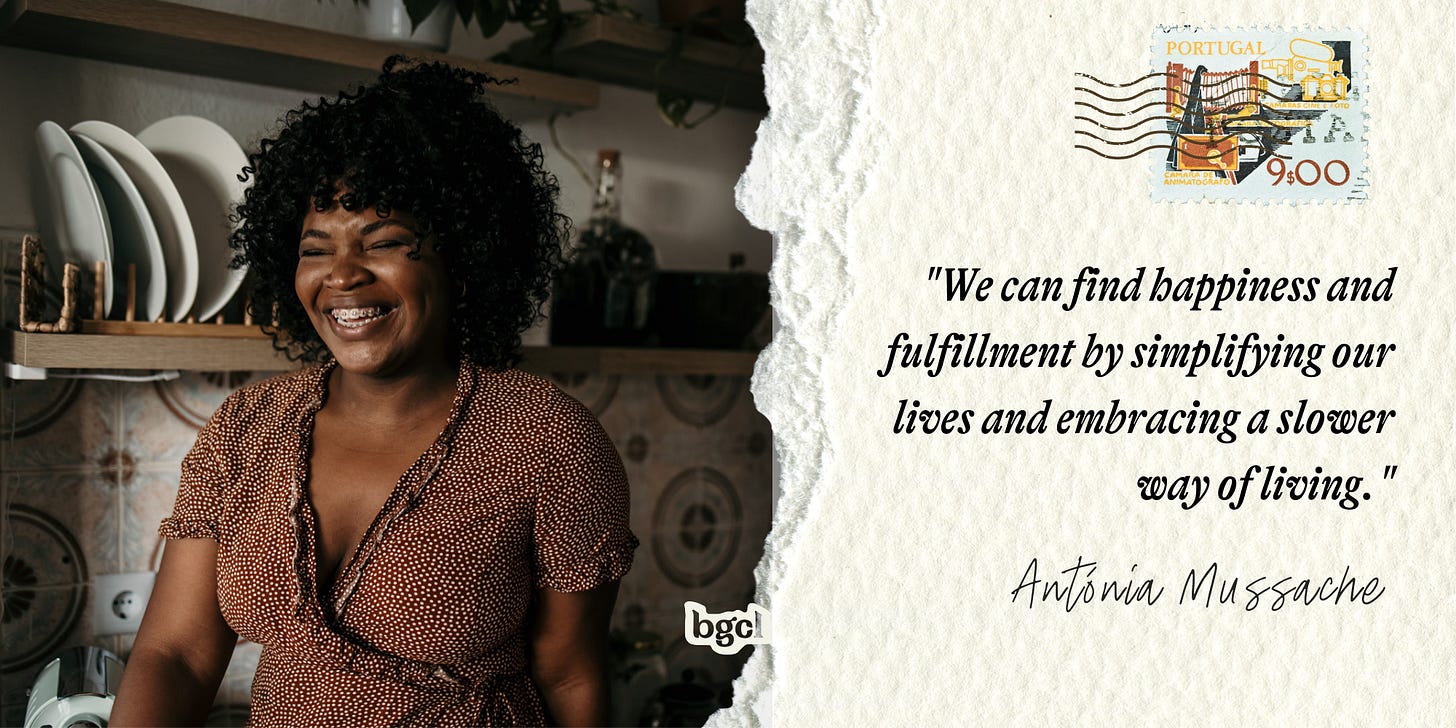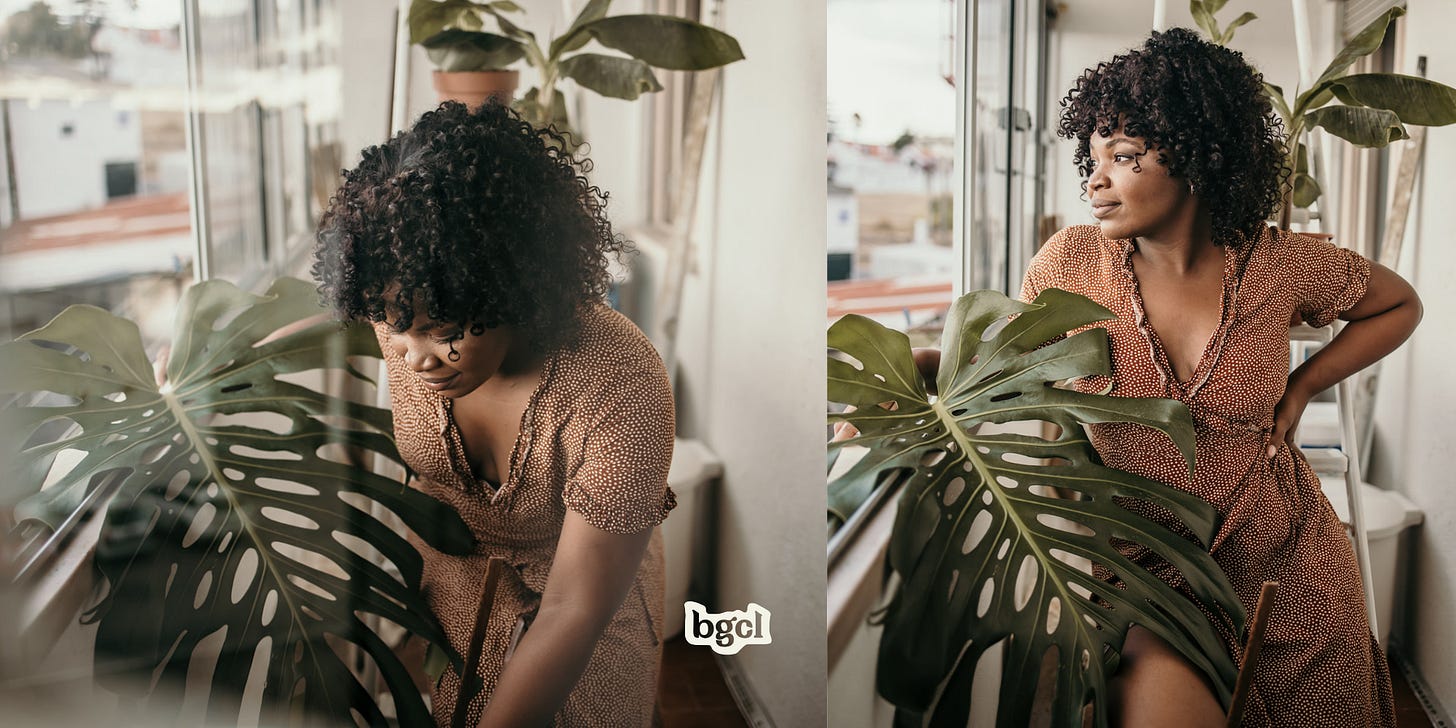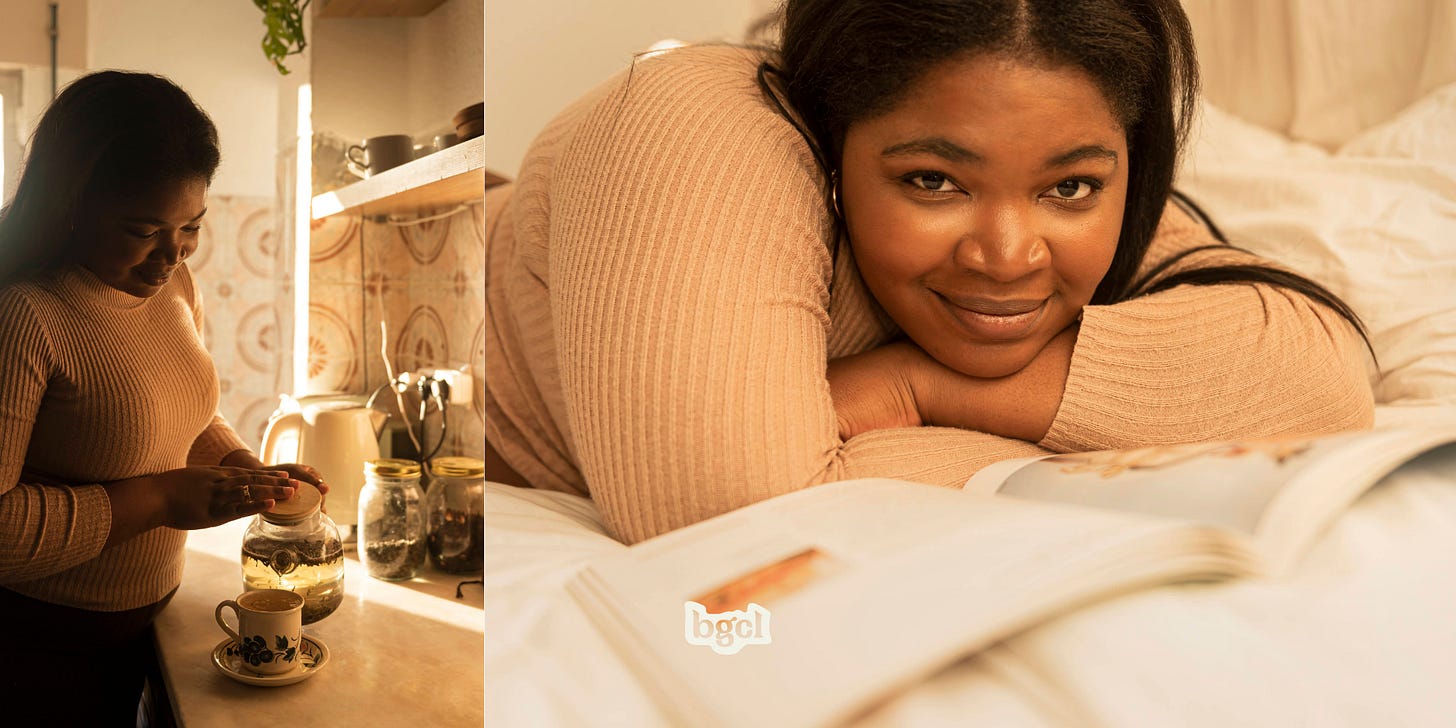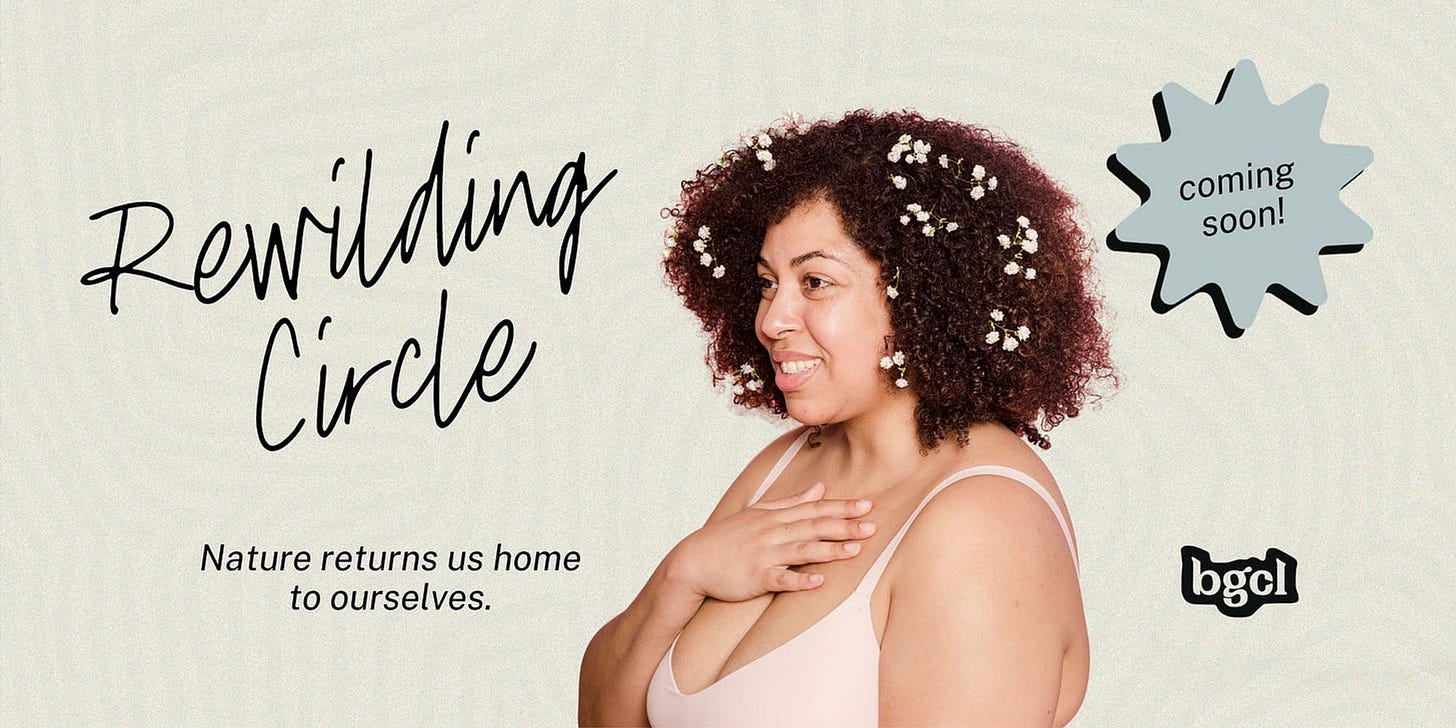BGCL explores nature as a way to reconnect to self, community, and the living world. We go outside to go inward, centering experiences of people of color. Let’s rewild!
Words on Rewilding // Care is Essential
My Dearest Wild Ones,
A year ago, we reached a major country living milestone–we decided to welcome animals to the homestead. We had never owned any pets, so this was a big step. Chickens seemed like a natural place to begin since we eat eggs daily, and we simply wanted to shortcut the trip the the grocery store. I happily announced our plan to friends and neighbors, and some cautioned me about the abundance of natural predators in the area. I was quick to dismiss these warnings, not wanting to face the fact that I was entering into a complex relationship with the living world.
One spring morning I dropped the kids at school and decided to make an impromptu stop at the country store. I promised myself I would “just look” before returning home for my morning meeting. In the store, I gravitated towards the glow of the heat lamps that hung over the stock tanks where the chicks huddled in small clusters. I skirted around the edge of the tanks, reading placards about each of the breeds, until I reached the final tank.
My eyes grew wide and I dropped down to my knees—these chicks were not chicks– they were ducklings.
My heart nearly stopped when I noticed a handwritten sign next to the trough that stated: “A Buck a Duck! Two minimum.” Excited and offended by this insane bargain, I claimed a set of ducks huddled tightly in a corner together. An employee scooped them up and plopped them into a happy-meal style box. As I rode home with them on the passenger seat, I rehearsed how I would tell my husband about this new lifestyle I just thrust us into. Ultimately I landed on the breathless statement, “I just got two ducks because they were on sale for a dollar, but they are basically the same as chickens, and I will take care of them.” He would hold me to this promise.
It wasn’t long before the ducks’ cuteness paled in comparison to the work they required. I was constantly refreshing bedding, cleaning food containers, and protecting them from the eagles and hawks that had taken notice of these tasty snacks in our yard. I was hauling 5-gallon jugs of water for them, cleaning up their poop, and could often be found running around with a broom in an attempt to corral them. This essential labor and care was a sharp contrast to the adorable instagram-worthy photos and videos I shared.
I was playing my part in perpetuating the myth that raising animals was always joyful, simple, and care-free.
Because the sex of the birds was unknown, I randomly assigned them names: Iggy and Barney. I wouldn't know for a few months whether we’d be getting eggs from either of them, and even then, it would be at least 6 months before eggs arrived. When I confirmed that one was male, I was upset that we had only one egg layer and one seemingly useless duck. This was compounded by my annoyance that Iggy, the male, was aggressive towards everyone, and would chase after my kids. I felt conflicted about my commitment to these animals. There were moments when I wished a predator would take him away, and I felt shame for having that thought.
Over the months, I continued to build the muscle of caring for these beings–even when I didn’t want to do it. Slowly, I began to enjoy their company in the garden and laugh out loud at the way they waddled through the forest. I witnessed the tenderness and reverence the two ducks had for one another and couldn’t help but be drawn into their world. Iggy turned out to be Barney’s unapologetic protector, allowing her to live her best life and forage in peace. My feelings of gratitude and appreciation fully blossomed when Barney began laying large, double yolk eggs.
It felt like all my hard work was worth it and my love was being reciprocated.
Not long after we had reached this harmonious balance, my husband reported to me that our neighbors lost all of their chickens to a raccoon. My heart dropped and tears welled in my eyes at the thought of losing our ducks. A day earlier, I was researching duck breeds, thinking about growing the flock. Now, I was forced to grapple with something so fundamental: the circle of life. I thought about Wendell Berry’s writing on animal husbandry, recalling that care taking is the essential practice that connects us to our place and to the living world. But that it does not exempt us from the cycles of nature that will always return us back to this earth.
Sadly, this reality came to pass a few weeks ago. I went to put the ducks in for the evening, but when I called for them, they did not come waddling out of the forest as they usually did. Instead, I found Barney lying alone in the cage, with her head tucked behind her wing. She was never alone and in that instant, I knew what had happened. My heart sank to the bottom of my stomach as I stared at this melancholy duck. With tears filling my eyes, I gathered all my courage and a dash of hope and headed into the woods. With each heavy step, I called Iggy’s name, until a puff of feathers on the ground confirmed what I already knew.
Tears flowed down my face as I shut Barney in the cage alone, feeling like I had failed to care for these beautiful beings.
I quickly rehoused Barney to another flock, and felt the pains of my empty nest. For many days, my muscle memory kept calling me to tend to the ducks. To walk them through the woods, fluff their bedding, refill their water, or collect the eggs. I played their final day over and over in my mind, trying to find an alternative ending. Soon, a deeper truth started to emerge. Iggy lived every moment in service to Barney, and he died serving his duty to her. They had relentless respect for each other that I grew to admire. In his passing, Iggy showed me once again that care is a mutual and selfless act that is essential to all life.
With care and kindness from your Rewilding Guide,
Sacred Stories // George Washington Carver
Essentialism is all about the foundations of life. It is coming back to the basic building blocks and knowing that all our needs can be met through simple elements. It is a way to identify and prioritize the fundamental aspects of our existence, and to orient ourselves around what is core. In doing so, we can create lives that are purposeful, meaningful, and fulfilling.
George Washington Carver, an American botanist and brilliant mind, lived and worked with a deep knowing of what was essential. While he is most widely known for his work with peanuts, his contributions extend far beyond this area and his work continues to be the foundation for sustainable agriculture today. He committed himself to studying the foundations of life, knowing that those pieces could unlock potential for himself and others—just as they did in nature.
Here are three ways that Carver invested in the foundations of life:
Spiritual connection to nature: From a young age, Carver felt at home in nature and had a deep sense of wonder about the natural world. He found a spiritual connection in the woods and felt connected to his greater purpose in those spaces. Even in his research, he allowed his spiritual connection guide his knowing about what was possible.
Caring for that which cares for us: Carver focused much of his research on helping Black farmers improve the soil quality to increase production and income. He identified specific crops and ways of working with the soil to ensure the land remained in good health. He understood that if farmers cared for the soil, they would be far more likely to remain independent farmers on the land.
Ongoing education: Carver was denied an education at many points of his life, and fought hard for everything he learned. He understood that knowledge created a solid foundation that could lead to advancement and greater opportunity. He believed that education was not just about acquiring information, but also about developing critical thinking skills, creativity, and a love of learning.
Carver's abundance of wisdom has enabled many others to thrive. His ability to know the world through spirit and science reminds us that both are valid and essential. He left a rich legacy to remind us that we must invest in the foundations in order to have sustainable growth in all parts of life.
Be sure to tune into the BGCL Podcast on 4/17 for a conversation with Jules Giuliano, an educator, soil researcher, and organic farmer. We will talk more about Carver’s legacy and the significance of soil to all life.
Kith Card // Antónia Mussache
Kithship is a belonging to a place and an intimate knowledge of that place. Each BGCL issue features a new kith interview of a person and a place that are deeply connected.
Stepping into simple, sustainable living
I was born in Angola and my family moved to Portugal during the Angolan Civil War when I was six years old. This experience shaped my worldview and eventually led me to embrace a more sustainable, intentional lifestyle. I started my blog, She Is Awake, to share my journey and inspire others to live in a way that aligns with their values. I also founded Zero Angola, a community-based project to reduce poverty and provide sustainability education.
What does sustainability mean to you?
To me, sustainability means living the way that supports the long-term health and wellbeing of the planet. My understanding of sustainability has evolved over the years, and I have learned more about the impact of our actions on the environment and the importance of taking responsibility. It really involves creating systems that support all life on earth, and recognizing that we are all some way connected with each other.
How has your place shaped who you are?
Living in Angola, my family experienced poverty. When we moved to Portugal there was abundance but also mindless consumption. Both shaped who I am today, and it has been a journey to find balance between the two extremes. I have learned the importance of living in harmony with the natural world and how we find happiness and fulfillment by simplifying our lives and embracing a slower way of living. It also taught me the value of community and the power of connecting with like-minded individuals who share the same values and patience.
How is nature apart of your slow living journey?
Nature is a huge part of my life and work. It is a crucial part of my self-development, helping me to stay grounded and connected to my heart. It's amazing how a simple walk reminds me of the grand scheme of things and brings peace into my life. I also try to bring elements of nature into my home to remember that I am part of nature. It has led me to approach my consumption habits with a sense of responsibility and practice harmony with nature.
You can check out more work by Antónia through She Is Awake (Blog / Instagram / Facebook) and Zero Angola (Instagram).
Rewilding Experiences // just the essentials
Go deeper into the ideas and themes this month. Dive deeper each month through the podcast, instagram, and live experiences.
BGCL Vibes: Songs about the essential parts of life, loving, and living to the fullest. It’s a set of life lessons that has traces of Stevie Wonder’s swagger, the stylings of John Legend, and melancholy of SZA. Dive in and enjoy the vibes!
BIPOC Women’s Rewilding Circle: Healing happens in community, and this is a sacred space to support your journey. Come learn how to find connection and belonging in the healing arms of Mama Nature. Join the waitlist to be in the next circle!
BGCL Podcast: The BGCL Magazine comes to life in the podcast, dropping into your feed on April 17th on Substack and all podcast platforms. It would mean so much if you would rate the show and leave a review on Apple and Spotify!
Thanks for reading, Wild One. Tap the ♡ if you enjoyed these stories.
Show your support: Share with a friend that could use some rewilding in their life.















Hillarie, I'm so sorry to read this about your precious Iggy. 💔 I remember finding my hens in the same way many years ago - such a horrible feeling. I had to rehome the one who survived as well, another heartbreak on top of the first, but like you said they have so much to teach us and I'm so glad I had the time with them that I did. Loved reading Antónia's responses to the questions here, beautiful photos too!
I'm sitting here unexpectedly crying at the loss of a duck that I never met... I guess the descriptions of mundane daily care touched on a raw motherhood nerve 😭